Whether you want to access geo-restricted content, enhance your privacy, or hide your IP address on the go, browser proxy extensions make it incredibly easy. You don’t need to configure full proxy servers or VPN apps. Instead, these lightweight tools sit right inside your browser, giving you instant control over your online identity with just a click.
Online privacy is now a requirement instead of a luxury. With data breaches seemingly leading the news every day and your ISP watching your every move, you have to find the right proxy extension for your browser.
But with so many options claiming to be the best, choosing the right one can be tricky. That’s why after checking dozens of services, we’ve picked the 7 best browser proxy extensions to use today. We’ll also guide you on how to use them.
However, it’s crucial to understand what these extensions can and cannot do. A proxy extension only reroutes your browser traffic through another server, changing your visible IP address. This is great for quick tasks like accessing a geo-blocked article or checking local pricing.
Nevertheless, they don’t provide full encryption like a VPN. Your data is not fully secure, and other applications on your computer are not protected. For sensitive browsing or full-system anonymity, a dedicated VPN or a private browser remains the superior choice. If you want the ease of a browser extension but the security of a VPN, check out our picks for the best free VPN Chrome extensions.
Top browser proxy extensions – Quick list
Before we get into the details, here is a quick snapshot of our top picks. This list is a combination of the best proxy extensions for Chrome and other browsers you can find currently.
- Decodo: Great functionality wrapped in an ease of use package; perfect for sneaker copping and social media management.
- Oxylabs: Professional-grade product made for web scraping and other data collection or extraction tasks.
- Webshare: Easy-to-use service with a generous free tier for testing and light use.
- Bright Data: The industry leader with threw the roof reliability and features for very heavy tasks.
- IPRoyal: Inviting developers and businesses for ease of control and impeccable performance.
- Rayobyte: High-quality and ethical residential and datacenter-style proxies along with an incredible support staff.
- GeoProxy: You will geo-target from the different specific places and with a level of precision, it would matter.
What is a browser proxy extension?
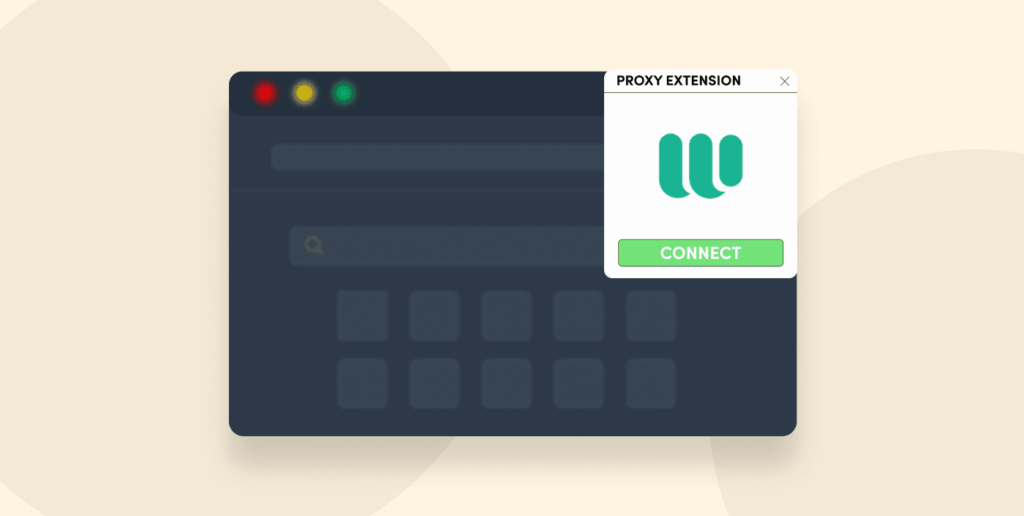
Before we get down to the list of best browser proxies, let’s explore what browser proxy extensions really are. You can think of browser extensions as just helpful tools that you plug into your browser that give it new superpowers. The work of a proxy extension is simply to make using a proxy server very easy.
Why is that important? Configuring a proxy server is often a technical nightmare. If you use Chrome, for example, you can’t even set up a proxy inside the browser itself; you have to go into your computer’s system settings. On the other hand, for Firefox, it is a little nicer, but you’re still going through menus to configure the proxy settings every time you want to change something (which is not ideal).
This is where a proxy extension really helps make life easier. They give you a simple button in the toolbar of the browser. With one simple click, you can turn on or off, or switch from one proxy server to another without hassle. It takes away that really complicated process and gives you a simple button to click (your brain will appreciate the help).
Best browser proxy extension to use today – Detailed list
What are the features that make each of these extensions stand out? Let’s take a look at the details:
1. Decodo
Decodo (previously known as Decodo) hits that ideal “not too hot, not too cold” level. It’s a powerful network, but without the confusing interface. If you want something powerful but don’t have time to read a 25-page manual, this is a go-to option.
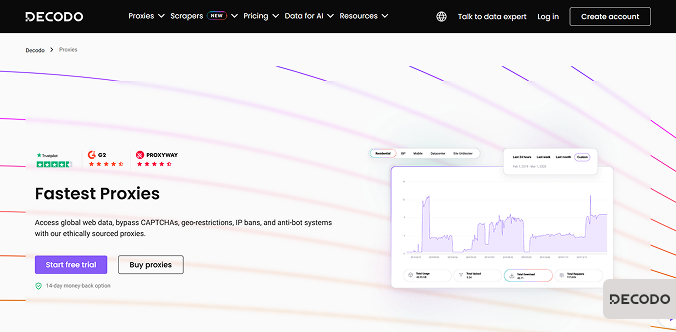
The browser extension is incredibly simple to use—just open it, click a few buttons, and you’re instantly connected to a vast residential IP network without any hassle. Pricing starts at around $1.50 per GB, with flexible pay-as-you-go options available. It’s not the cheapest solution out there, but it offers solid value without stretching your budget.
Perfect for marketers, sneakerheads, or anyone who wants solid performance without the hassle; just plug in, relax, and let it do the work for you.
- No sneaky fees hiding in the fine print
- Sneaker copping and social management
- Easy configuration
- Lack of flexibility
2. Oxylabs
Oxylabs has a high-level, enterprise-level solution built for serious web data collection and automation, where every request is large and highly reliable.
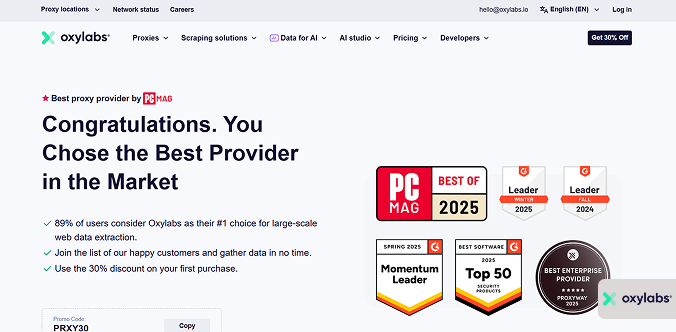
The extension works seamlessly with access to Oxylabs’ large network of both residential and datacenter IPs, with high technology built in to get through the toughest challenges. If you are a large corporation or a pro data scientist, and you want the best, Oxylabs is like bringing a bazooka to a knife fight.
However, the free version has some limitations (understandably).
- Unmatched reliability
- Perfect for larger web scraping and automation needs
- Technical and account support are second to none
- Has a high barrier to entry
3. Webshare
Webshare is great for newbies. It works excellently when you’re just dabbling in proxies or don’t feel like burning cash upfront. No sneaky fees, no complicated setups, and you don’t even need a credit card to get it rolling.
When you sign up, you get 10 proxies free with Webshare, even without paying any subscription fee. So, if you are looking to get the best free browser proxy extensions for charge, Webshare is the one.
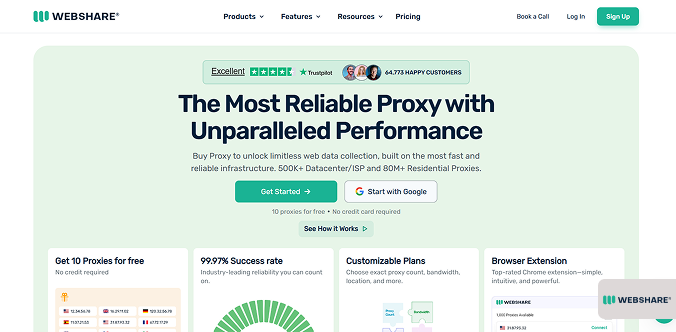
Also, we found configuring everything like a breeze. The dashboard won’t make your eyes bleed, even if you’re allergic to clutter, and there’s a browser extension if you’re the “less clicking, more chilling” type. A free plan exists, and the upgrades (as low as $2.99/month) are worth trying.
The free plan is best to get a feel for Webshare’s services but is limited in performance and features for more intensive workloads.
- Perfect for testing the waters or just messing around with light proxy use
- Extremely easy to use
- Most reliable free tier
- Not ideal for large Enterprise workloads
4. Bright Data
Bright Data is arguably the most complete proxy management solution available as a browser extension—built for both businesses and power users. It’s an industry leader for a reason.
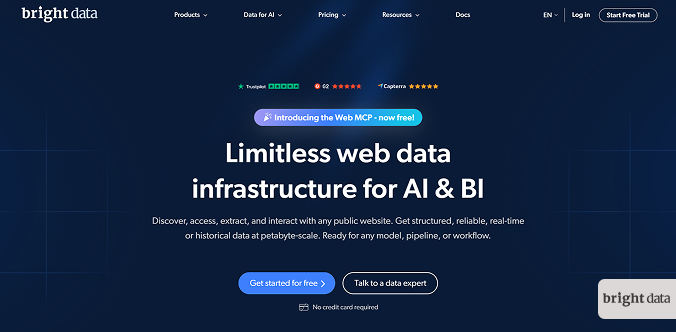
The extension connects you to Bright Data’s massive global proxy network, which includes residential, datacenter, and mobile IPs across multiple countries. With advanced tools like session management, IP rotation, performance analytics, and automation options, it’s a top-tier product designed for serious workloads.
However, when it comes to pricing, it is considered one of the most expensive options. Also, some features are overkill for casual or light users.
- Unmatched features
- Best for larger businesses
- The most comprehensive network on the market
- Very expensive if you do not have an enterprise account
5. IPRoyal
One of the best things about IPRoyal is that it doesn’t clutter your experience with unnecessary fluff; just clean, transparent, and high-quality proxies that actually deliver. If you’re a developer or small business owner tired of unreliable connections, IPRoyal feels like that steady friend who always shows up when things get messy.
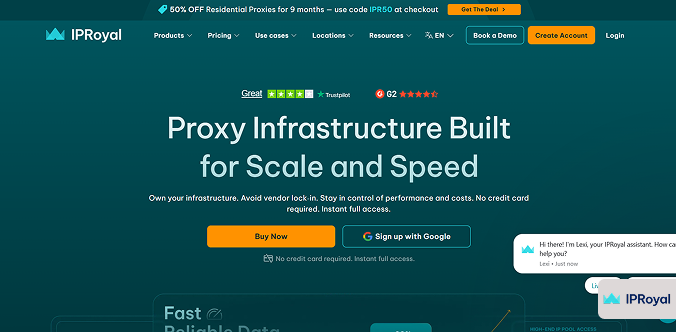
The browser extension is refreshingly simple to use. Want static residential proxies? They’ve got them, and none of the sketchy, low-quality stuff either. These IPs are stable and persistent, meaning you’re far less likely to get kicked off the platforms you rely on.
Pricing is mid-range, starting at around $1.57 per proxy, with both monthly and pay-as-you-go options available. It’s fair and predictable (though not the cheapest on the market).
That said, IPRoyal isn’t perfect. Its speeds can fluctuate during heavy loads, and customer support isn’t always lightning-fast. But if you value transparency, reliability, and a no-drama setup, IPRoyal hits the sweet spot.
- Affordable prcing
- Consistent with its design and user-friendliness
- Extremely reliable
- Has a small network
6. Rayobyte
Rayobyte (formerly known as Blazing SEO) has built its name on ethics, transparency, and customer care. Unlike many proxy providers that cut corners, Rayobyte focuses on acquiring proxies responsibly and backing them with genuinely helpful support. It’s a company that values doing things the right way, not just flooding you with as many IPs as possible.
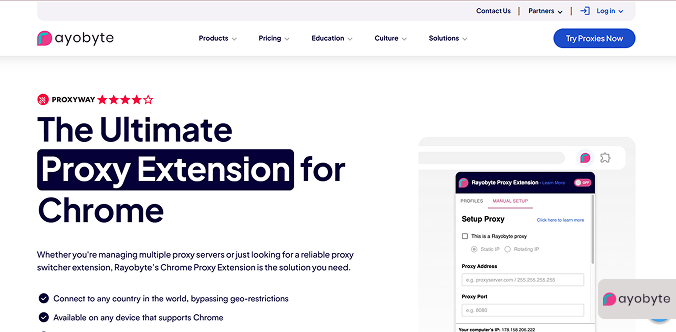
Their datacenter and residential proxies are impressively clean and stable (no constant bans or shady sources here). Everything is transparent, from pricing to proxy performance; no hidden clauses or fine print to trip you up. Pricing is average, starting at around $0.90 per GB for low usage. It’s a fair deal.
If you’re part of a team that values ethics, stability, and quick support, Rayobyte is a breath of fresh air. The only downsides? Limited advanced features and a smaller network compared to big players. Still, for users tired of sketchy providers, Rayobyte is the palate cleanser you didn’t know you needed.
- Best for businesses
- Helpful support
- Reliable for multi-tasks
- Potential for IP blocking
7. GeoProxy
GeoProxy does exactly what its name promises. It’s all about geo-targeting with precision. This tool lets you appear as if you’re browsing from a specific city or region, and it does so with remarkable accuracy. For anyone dealing with localized pricing, ad verification, or region-specific data collection, that kind of precision is pure gold.
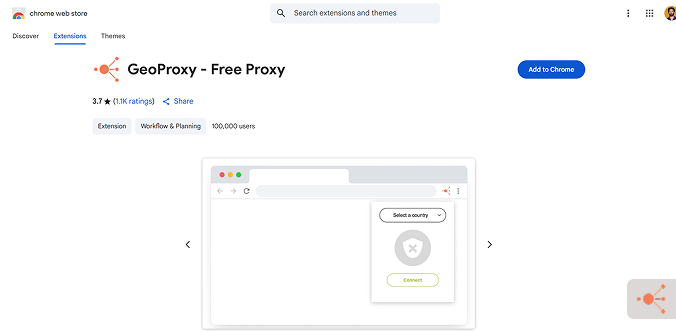
The best part? The GeoProxy Chrome extension is completely free; no subscriptions, no hidden catches. It’s a simple, no-frills solution for users who just need to spoof their location accurately without diving into complicated setups.
That said, it’s not designed for heavy-duty scraping or high-volume tasks, and performance and reliability can vary with free usage. But for users who only need to appear from a specific area or verify local content, GeoProxy gets the job done efficiently and at zero cost.
- Reliable for bypassing geo-restrictions
- Effective for location-sensitive tasks
- Best in class when you want to appear from a specific city
- Limited functionality
Comparison table of the best browser proxy extensions
This table will help you get a quick look at what each proxy extension has to offer, compare them side by side, and help you make a decision fast.
| Proxy extension | Free tier | Server locations | Best for | Proxy types | Price range |
|---|---|---|---|---|---|
| Webshare | Yes (10 free proxies) | 100+ countries | Beginners & free tier access | Residential, Datacenter | Free to Budget |
| Oxylabs | No | 195+ countries | Large-scale web scraping | Residential, Datacenter | Enterprise |
| Decodo | No | 195+ countries | Ease of use & sneaker copping | Residential, Mobile | Mid-Range |
| Bright Data | No | Unlimited (Global Coverage) | Enterprise reliability | Residential, Datacenter, Mobile | Enterprise |
| IPRoyal | No (Pay-as-you-go) | 195+ countries | Developers & businesses | Residential, Static Residential | Mid-Range |
| Rayobyte | No | 25+ countries | Ethical sourcing & support | Residential, Datacenter | Mid-Range |
| GeoProxy | Extension is free | 150+ countries | Precise location targeting | Residential | Mid-Range |
What to consider when choosing a good browser proxy extension

Not all extensions are created the same. What separates the best from the rest? Here are some of the key things we looked at when selecting our top picks:
- Browser support: When it comes to browsers, Chrome comes at the top, but a great extension should work on other browsers as well, like Firefox or Edge. Having more options is always better.
- Proxy flexibility: Some extensions are made by proxy companies, and only work if you are using them with their proxy service. Others are like universal remotes that allow you to use any proxy you choose. It’s better to look for this flexibility.
- Proxies included: Is it a truly online free proxy browser extension, and does it come with working servers? This is a big deal, especially since finding a good free proxy on your own can be a risky gamble. If a well-known service provider owns it, that’s a huge plus. We’ve done the vetting for you in our separate guide to the best free proxy servers, which is a safer alternative to random free proxies found online.
- Ease of use: We are all skeptical of programs or tools that want you to create an account before you even get a chance to try the tool. The best browser extensions will be fast and simple to begin using, so we gave them higher consideration.
- Extra features: Think of things like automatically rotating your IP address, clearing cache while your proxy is connected, creating custom rules for which sites use the proxy, which are all advantages to having.
The most crucial thing you need to consider, however, is security. To function at all, every one of these extensions needs to ask permission to “read and change all your data on the websites you visit.” That’s a lot of trust to place on something, and so selecting a reliable, reputable developer isn’t just recommended; it’s necessary to ensure your safety.
How to install and use a proxy extension
Installing a proxy extension is not too difficult, but installing it correctly means a lot. Here is a general, step-by-step approach that works for most extensions:
Step 1: Select your extension
Go to the Chrome Web Store (or whatever platform you get your extensions from) and search for the proxy extension you selected last time. You typically want to check on the ratings from other users and, if available, the most recent reviews.
Step 2: Install the extension
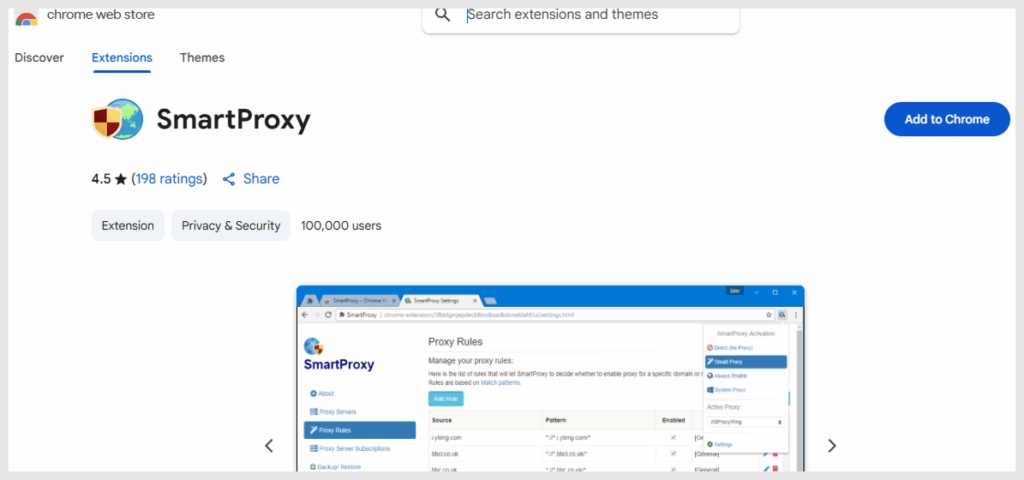
Click on “Add to Chrome,” and accept the permissions; most proxy extensions require permissions to change your network settings. This is completely normal and necessary to run.
Step 3: Configure your proxy settings

Open the extension from your browser toolbar; these extensions usually require you to:
- Log in with the information you used in creating an account on the proxy service’s website.
- Choose an authentication method (if applicable).
- Choose your proxy protocol (HTTP, HTTPS, SOCKS5).
Step 4: Select a location
Many extensions will let you pick the country and/or city from a list, as well as the IP location that you would like to use. If you want to watch something that is UK-only, you have to select a server in the UK.
Step 5: Connect, then browse
Click the “Connect” or “On” button. The icon will change, and your browser-based traffic is now being transmitted through the proxy.
Step 6: Check your connection
Don’t trust the setup until you have tested it. Open whatismyipaddress.com, or the like, to confirm that your IP address has changed.
Step 7: Adjust settings
Most extensions allow some preferences, including:
- Automatic proxy switching based on rules for websites.
- Proxy rotation for better anonymity.
- Bypass the list of websites to bypass the proxy.
Pro tip: Always keep a backup proxy setup; if your provided server goes down, you can immediately switch to another one without your browsing session being interrupted.
Which proxy extension is best for content filtration?
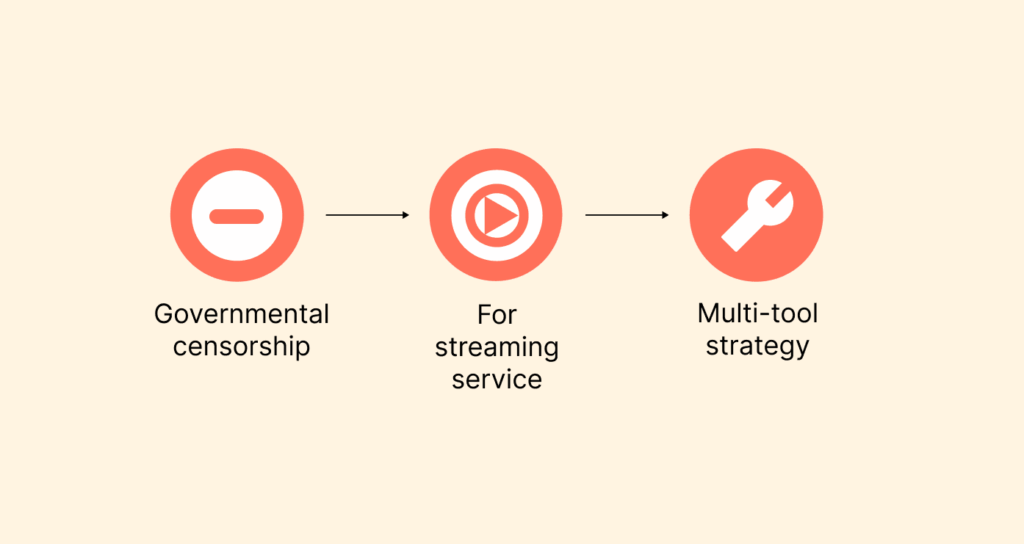
We often get questions about these topics, but the type of proxy you will use depends on the nature of the filtering you want to accomplish. Most people turn to proxies to bypass filters; however, businesses deploy them to actually filter content.
For example, a school might want to block social media traffic, or a company might want to block access to non-work-related sites. Regular consumer proxy extensions are not going to be able to facilitate this type of task since most content filtering is ultimately done on the network level and requires dedicated software and equipment.
That said, certain best browser proxy extensions for PC, such as Bright Data or Oxylabs, used in corporate environments, can be incorporated into systems to monitor user access and enforce content policies.
For filters at the workplace or school
These filters tend to be the least complicated – they just block sites based on the categories. An easy-to-install, general-purpose extension like Storm Proxies or Webshare can definitely cut it. The key is to use an extension with servers that haven’t already been banned by school or work filters. They are simple and fast for getting past basic restrictions.
Governmental censorship or advanced blocks
This is where you’d need a more heavy-duty solution. More advanced systems are set up to detect and block proxy traffic. If you’re in this realm, you’ll need to use something more advanced with IP addresses that look like normal users.
Services such as Bright Data’s residential proxies or Decodo are more effective because their IP addresses look like normal organic traffic, which allows these tools to not be as easily detected and blocked.
For streaming service geo-blocks
Streaming services like Netflix usually have very good ways of detecting proxies. If you are trying to get past streaming services for geo-blocked content, you’ll need an extension more tailored for mainly geo-targeting, such as GeoProxy, that has servers more appropriate for specific functions, such as streaming.
Such type of proxies are much better than generic tools for this purpose, as their sole focus is keeping their IP addresses under the radar so streaming services will not ban them.
Multi-tool strategy
The best strategy is often to have more than one option. Keep your primary extension, Decodo, for general daily browsing and a special tool like GeoProxy for specific access. This backup plan will be your best strategy if you want to regularly access content and avoid getting locked out.
Keep in mind that content filtering is an arms race. Something content filtering may block whatever works today, tomorrow, so the ability to be agile and have options is very valuable. For content filtering on your own network, a DNS filtering service or dedicated security suite is always going to be a better solution than a browser extension.
FAQs
Free proxy extensions can pose a risk, as many of them generate revenue by selling your data or putting up tons of ads. It is always safer to pay for the service, especially if you are browsing sensitive materials.
A proxy extension routes only your browser traffic, meaning the only thing being routed through the proxy server is or browsing history. A VPN encrypts all data leaving or going to your device. If you have full security, it’s better to use a VPN. If you’re just doing a quick browser-only task, then a proxy will suffice.
It could be possible, but it is becoming more challenging, since Netflix and other platforms are on the lookout for proxies and continuously blocking them. A VPN is a more dependable method to access streaming content that is geo-blocked is much more consistent and reliable.
Most extensions should work satisfactorily on other Chromium-based browsers, like Brave and Edge. Some extensions may work for Firefox as well, but it is usually worth checking the official proxy extension page first.
They can, because your traffic must go through an additional server, which can lead to latency. Free services are usually slower during high traffic periods compared to paid proxies.

